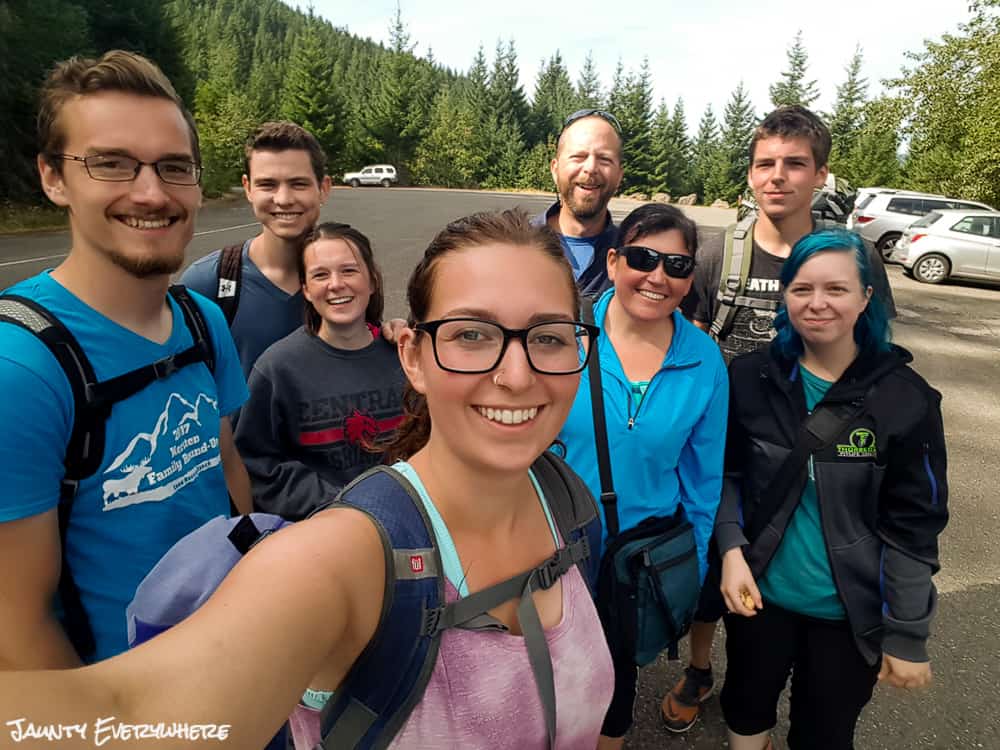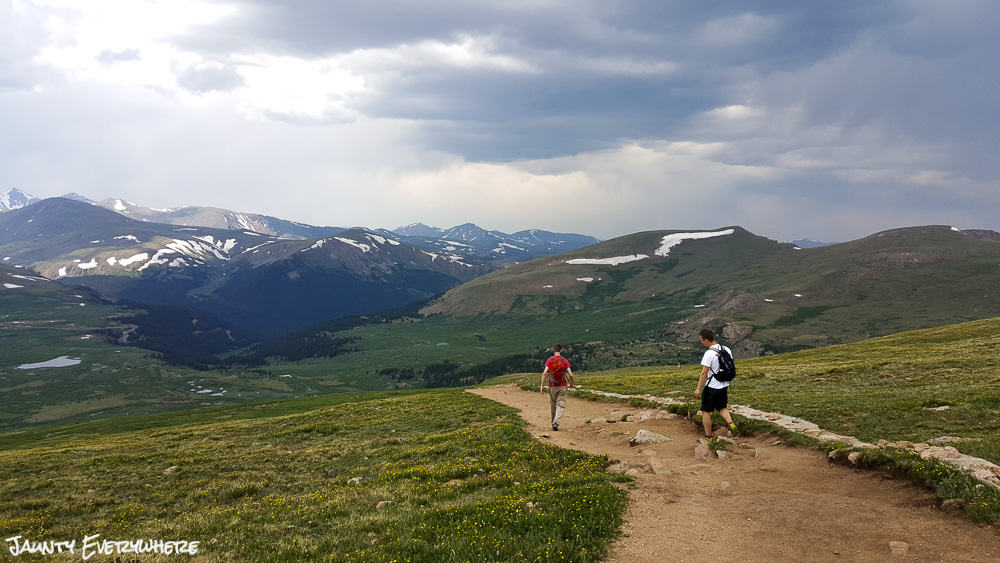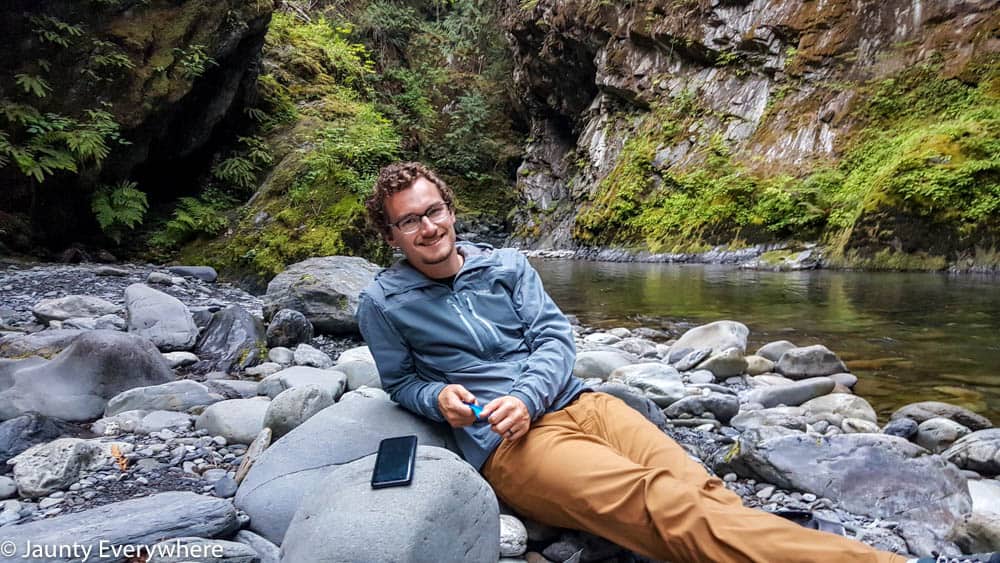When most people think of hiking, they picture a physical activity that gets the heart pumping and the legs moving.
However, hiking is more than just a form of exercise; it can also be an intellectual experience that offers numerous mental health benefits to improve overall well-being.
As an active person who enjoys moving, achieving goals, and learning new skills, I’ve discovered that hiking with your brain is just as important as hiking with your body.
In this post, I’ll share some ways I’ve found to encourage healthy “brain work” while hiking and explore the incredible mental health benefits of hitting the trails.
Get there faster:
Refocusing on What is Important

Reducing Stress and Anxiety
Hiking is an excellent way to reduce stress and anxiety, providing a much-needed escape from the daily pressures of life. By immersing yourself in nature and engaging in physical activity, you can calm your mind, promote relaxation, and enjoy a digital detox.
Calms anxiety
Hiking can be very relaxing if we let go of whatever stresses we carry around.
Leave your worries in the car, at the trailhead, or even at your front door.
By letting go of your worries, you create the mental space to fully immerse yourself in the hiking experience and allow the natural surroundings to soothe your anxious thoughts.
Promotes relaxation
Hiking doesn’t usually require a lot of thought.
I love the space this gives for other mental pursuits. When you’re on the trail, your mind can wander, daydream, or be present.
This break from the constant demands of daily life can be incredibly relaxing, allowing you to return to your responsibilities with a clearer, more refreshed mindset.
Provides a digital detox
In today’s constantly connected world, it’s easy to feel overwhelmed by the barrage of information and stimulation from our digital devices.
Separating yourself from the digital world can give you the thinking space to reconsider what you’re pursuing and whether you will genuinely find it valuable when it comes to its forecasted end.
During your hike, taking a break from screens and technology gives your mind a chance to reset, recharge, and focus on the things that truly matter to you.

Improving Cognitive Function
Hiking benefits physical health and has a profound impact on cognitive function. This outdoor activity can boost creativity, enhance memory, and cultivate mindfulness.
Boosts creativity and problem-solving
Hiking can be a tremendous source of inspiration. Getting outdoors and surrounding yourself with nature can be a great way to work through ideas and problems.
I don’t know what it is about getting outside, but every time I do, ideas, projects, and inspiration flood my mind, and I inadvertently start to plan, create, and imagine. I can renew excitement for things I was getting burnt out on or needed a new direction.
Being outdoors opens up a new realm of inspiration and freedom of thought that isn’t available in an office or workspace. The separation from routine and usual distractions can help clear your mind, allowing you to come up with great new ideas.
I’ve gone hiking while working on an extended project—a blog post, costume design for a film, or a video series. I’ll go into the hike feeling spent or frustrated, but by the time I get back, I’ll have new ideas, fresh motivation, and plans for the next steps.
The key to reaching this point during your hike is becoming aware of what surrounds you. Spend time without thinking about the current project and let yourself soak up the sights, smells, and feel of wherever you are.
Enhances memory
Research has shown that regular physical activity like hiking can improve memory function.
Combining exercise and exposure to natural environments stimulates the growth of new brain cells and strengthens neural connections, leading to better memory retention and recall.
Additionally, the memorable sensory experiences encountered during a hike, such as stunning vistas or unique flora and fauna, can create lasting imprints on your mind, further enhancing your ability to store and retrieve information.
Encourages mindfulness
Another way I like to hike intellectually is to take the time to be present in the moment.
Mindfulness, or focusing on the present moment without judgment, has been linked to numerous cognitive benefits, including reduced stress, improved concentration, and increased emotional regulation.
Hiking provides an ideal opportunity to cultivate mindfulness by directing your attention to your breath, the sensation of your feet hitting the ground, or the sights, sounds, and smells of the natural world around you.
Regularly practicing mindfulness during your hikes can train your brain to be more present and focused in your daily life, leading to improved overall cognitive function.
Enhancing Mood
Hiking is beneficial for physical health and cognitive function and has a significant impact on emotional well-being. Regularly engaging in this outdoor activity can increase self-esteem and confidence, promote positive thinking, and reduce rumination.
Increases self-esteem and confidence
Completing a challenging hike or reaching a summit can provide an incredible sense of accomplishment, boosting your self-esteem and confidence.
As you overcome obstacles and push yourself to new limits, you prove to yourself that you are capable of more than you might have believed. This increased self-assurance can spill over into other areas of your life, helping you tackle challenges with greater ease and confidence.
Moreover, hiking allows you to set and achieve personal goals, whether hiking a certain distance, reaching a specific destination, or improving your fitness level.
Each goal you accomplish reinforces your belief in your abilities, further enhancing your self-esteem and confidence.
Promotes positive thinking
Spending time in nature promotes positive thinking and reduces negative thought patterns.
The beauty and serenity of the natural world can help shift your focus away from daily stressors and negative emotions, allowing you to appreciate the present moment and cultivate a more optimistic outlook.
Additionally, exercise, such as hiking, stimulates the release of endorphins, the body’s natural mood boosters. These “feel-good” chemicals can elevate your mood, reduce feelings of anxiety and depression, and promote an overall sense of well-being.
Reduces rumination
Rumination, or the tendency to repeatedly dwell on negative thoughts and experiences, can be detrimental to your mental health. Hiking provides a healthy distraction from these negative thought patterns by engaging your mind and body in the present moment.
As you focus on navigating the trail, taking in the scenery, and regulating your breath, you leave less mental space for rumination. Hiking’s physical exertion can also help release pent-up emotions and provide a sense of catharsis, allowing you to process and let go of negative thoughts more easily.
Plus, the solitude and peace found in nature can offer a conducive environment for self-reflection and introspection.
By exploring your thoughts and emotions in a calming setting, you can gain new perspectives and develop healthier coping mechanisms to manage rumination.

Boosting Physical Health
In addition to its numerous mental health benefits, hiking is an excellent way to improve physical health. Regular hiking can increase fitness, build endurance, and boost the immune system.
A healthy body is critical for a healthy mind.
Increases physical fitness
Hiking is a full-body workout that engages multiple muscle groups, including your legs, core, and upper body.
You challenge your muscles as you navigate varying terrains and inclines, increasing strength and tone. Hiking’s weight-bearing nature also helps maintain and improve bone density, reducing the risk of osteoporosis and other bone-related conditions.
Hiking is a cardiovascular exercise that elevates your heart rate and breathing, improving the health and efficiency of your heart and lungs.
Regular cardiovascular exercise, such as hiking, can lower your risk of heart disease, hypertension, and diabetes while helping maintain a healthy body weight.
Builds endurance
Consistent hiking helps build endurance by gradually increasing your body’s ability to sustain physical activity over longer periods.
As you tackle longer trails and more challenging terrain, your body adapts to the demands placed upon it, improving your stamina and reducing fatigue.
Building endurance through hiking enhances your performance on the trail and translates to other aspects of your life. Improved endurance can help you maintain energy and focus throughout the day, making it easier to handle physical and mental challenges.
Boosts immune system
Regular moderate exercise, such as hiking, has been shown to boost the immune system.
When you hike, your body’s circulation increases, allowing immune cells to move more efficiently and detect and combat pathogens.
Additionally, hiking often exposes you to various natural environments, including forests and other green spaces.
These environments are rich in phytoncides, natural compounds emitted by plants that have been shown to increase the activity of natural killer cells, a type of white blood cell that plays a crucial role in the immune system.
The stress-reducing effects of hiking can also contribute to a healthier immune system.
Chronic stress can weaken the immune response, making you more susceptible to illness and disease.
By reducing stress levels through hiking, you create a more favorable environment for your immune system to function optimally.

Fostering Social Connections
Hiking is a great way to improve your physical and mental health and offers numerous opportunities to foster social connections.
Whether you join a hiking group, explore trails with friends and family, or strike up conversations with fellow hikers, this outdoor activity can help promote social interaction, offer shared experiences, and strengthen relationships.
Promotes social interaction
Hiking provides a natural setting for social interaction, whether hiking with a group or encountering other hikers on the trail.
Joining a hiking club or group can be an excellent way to meet new people who share your interests and passion for the outdoors. These groups often organize regular hikes, providing a structured opportunity to connect with others and expand your social circle.
Even if you prefer to hike alone or with a smaller group of friends, the trails offer plenty of impromptu social interactions.
Greeting fellow hikers, asking for directions, or sharing trail conditions can lead to brief yet meaningful exchanges that contribute to a sense of community and camaraderie among hikers.
Offers opportunity for shared experiences
Hiking with others allows you to create shared experiences and memories that strengthen bonds and deepen relationships.
When you and your hiking companions navigate challenges, appreciate breathtaking views, or celebrate reaching a summit together, you form a unique connection based on these everyday experiences.
Sharing the joys, struggles, and triumphs of a hike can foster a sense of teamwork, support, and understanding among hiking partners.
These shared experiences can serve as the foundation for lasting friendships and provide many stories and memories to reflect upon long after the hike.
Strengthens relationships
Hiking offers an opportunity to disconnect from the distractions of daily life and focus on the people around you.
Without the constant interruptions of technology and the demands of work or other responsibilities, you can engage in more meaningful conversations and give your full attention to your hiking companions.
The natural setting and physical activity of hiking can also create a relaxed, low-pressure environment that encourages open communication and vulnerability.
Walking side by side, you may find it easier to share thoughts, feelings, and experiences with your hiking partners, leading to deeper, more authentic connections.
Hiking can help strengthen existing relationships by providing a shared goal and a sense of accomplishment.
Working together to plan a hike, navigate the trail, and overcome challenges can bring you closer to your friends, family, or significant other, fostering greater trust, support, and understanding within these relationships.

Connecting with Nature
One of the most profound benefits of hiking is its opportunity to connect with nature. By immersing yourself in the great outdoors, you can experience adventure, increase vitamin D exposure, and enhance your spiritual connection.
Provides a sense of adventure
Hiking offers a thrilling sense of adventure as you explore new trails, discover hidden gems, and push your limits.
Each hike presents challenges and rewards, from navigating rugged terrain to uncovering stunning vistas.
This element of exploration and uncertainty can be incredibly invigorating, providing a break from the predictability of daily life and reigniting your sense of curiosity and wonder.
Embracing the adventurous spirit of hiking can also help you develop a greater appreciation for the natural world and its many wonders.
As you venture into the wilderness, you may encounter diverse flora and fauna, witness awe-inspiring landscapes, and experience the raw beauty of the earth in a way that is impossible to replicate indoors.
Increases vitamin D exposure
Hiking outdoors exposes you to natural sunlight, which is essential for producing vitamin D in your body.
Vitamin D is crucial in maintaining strong bones, regulating the immune system, and supporting overall health and well-being.
Many people, especially those who live in urban areas or spend most of their time indoors, may be deficient in vitamin D.
Hiking provides an enjoyable and natural way to increase your vitamin D levels, as even a moderate amount of sun exposure during a hike can stimulate your body’s production of this essential nutrient.
Enhances spiritual connection
For many people, hiking is not just a physical activity but also a spiritual experience.
The serenity and beauty of nature can evoke a profound sense of connection to something greater than oneself, whether it is God, the universe, or the interconnectedness of all living things.
As a Christian, hiking offers me an opportunity to find peace in the quietness and beauty around me and to seek God in prayer.
The stillness and majesty of the natural world create an ideal environment for introspection, meditation, and spiritual reflection.
Hiking allows me to step away from the noise and distractions of everyday life and connect more deeply with my faith, finding restoration for the places in me that need healing.
Regardless of your religious beliefs or spiritual practices, hiking can allow you to connect with something larger than yourself.
By soaking up everything the world around you has to offer and enjoying the moment you are in, you may find that hiking nourishes your body and mind and feeds your soul.
Developing Resilience
Hiking is a fantastic way to improve your physical and mental health and an excellent opportunity to develop resilience. Regularly engaging in this challenging outdoor activity can foster mental resilience, promote a sense of accomplishment, and encourage personal growth.
Fosters mental resilience
Hiking often involves facing and overcoming challenges, such as navigating rugged terrain, enduring inclement weather, or pushing through physical fatigue.
By confronting these challenges head-on and persevering through them, you develop mental resilience – the ability to adapt and bounce back from adversity.
As you encounter obstacles on the trail and find ways to overcome them, you train your mind to approach difficulties with a problem-solving mindset.
This mental resilience can be transferred to other areas of life, helping you better cope with stress, setbacks, and hardships in your personal and professional endeavors.
Promotes a sense of accomplishment
Completing a challenging hike or reaching a summit provides an undeniable sense of accomplishment.
The pride and satisfaction of setting a goal, working towards it, and ultimately achieving it can be incredibly empowering and rewarding.
This sense of accomplishment can boost your self-confidence and self-esteem, reminding you of your capabilities and strengths.
By regularly setting and achieving hiking goals, you reinforce the belief in your ability to overcome obstacles and succeed, which can positively impact your mindset and approach to life’s challenges.
Encourages personal growth
Hiking presents numerous opportunities for personal growth and self-discovery.
As you push your limits, confront your fears, and step outside your comfort zone, you learn valuable lessons about yourself and your potential.
The challenges and triumphs encountered on the trail can serve as powerful metaphors for the challenges and successes you face in life.
Reflecting on your hiking experiences and the insights you gained from them can help you cultivate a greater understanding of yourself, your values, and your goals.
The solitude and introspection that often accompany hiking can provide a space for deep self-reflection and personal growth.
As you spend time in nature, disconnected from the distractions of daily life, you may find clarity and perspective on important aspects of your life, enabling you to make meaningful changes and pursue personal development.
Improving Sleep Quality
In addition to its numerous physical and mental health benefits, hiking can also significantly improve sleep quality.
This outdoor activity can help regulate sleep patterns, reduce insomnia symptoms, and promote deeper, more restful sleep.
Like general physical health, good sleep is foundational to good mental health.
Helps regulate sleep patterns
Exposure to natural light during a hike can help regulate your body’s circadian rhythm, which governs your sleep-wake cycle.
When you spend time outdoors, especially in the morning or early afternoon, your body absorbs sunlight, suppressing the production of melatonin, the hormone that makes you sleepy.
This exposure to natural light helps align your body’s internal clock with the external day-night cycle, promoting a more consistent and regular sleep schedule.
By hiking regularly and maintaining a consistent sleep routine, you can train your body to feel sleepy and wake up at appropriate times, improving sleep quality and daytime alertness.
Reduces insomnia symptoms
Hiking can be an effective natural remedy for insomnia and other sleep disorders. The physical exertion involved in hiking helps tire your body, making it easier to fall asleep at night.
Additionally, the stress-reducing effects of hiking can help calm your mind, alleviating the anxiety and racing thoughts that often contribute to insomnia.
Exposure to natural light during a hike can help regulate melatonin production, ensuring that your body produces this sleep-inducing hormone at the right times.
By combating insomnia symptoms through regular hiking, you can improve the quality and quantity of your sleep, leading to better overall health and well-being.
Promotes deeper, more restful sleep
Hiking provides a combination of physical activity, stress reduction, and exposure to natural light that can lead to deeper, more restful sleep.
When you engage in a challenging hike, your body requires a period of recovery and repair, which occurs primarily during deep sleep stages.
During these deep sleep stages, your body releases growth hormones that promote muscle repair, tissue regeneration, and immune system support.
Regular hiking can stimulate the need for this restorative deep sleep, ensuring that your body receives the rest and repair it needs to function optimally.

Refocusing on What’s Important
In today’s fast-paced, information-saturated world, it’s easy to lose sight of what truly matters to us.
We are constantly bombarded with distractions and demands on our time and attention, making it challenging to prioritize our goals and values.
Hiking provides a valuable opportunity to step away from the noise and refocus on what is most important.
When we separate ourselves from the digital world and immerse ourselves in nature, we create the mental space to reconsider our pursuits and evaluate whether they align with our long-term objectives.
For some, this may mean reassessing their dedication to their job, family, success, or children.
By removing ourselves from the constant stream of information and demands, we can gain the clarity needed to identify what we truly care about and may neglect.
Hiking allows us to break free from the cycle of doing things we don’t care about or doing too many things poorly. It allows us to reassess our priorities and make conscious choices about where to focus our time and energy.
This clarity can be invaluable when considering different activities, jobs, or hobbies to pursue.
By stepping away from the massive amounts of input and allowing our minds to reset, we can better discern what we want to take on and what we should let go of.

Incorporating hiking into your mental health self-care routine can be a powerful way to support your overall well-being.
Whether you embark on a short nature walk or a challenging backcountry trek, immersing yourself in the outdoors and engaging in physical activity can have profound effects on your mind, body, and soul.
By making hiking a regular part of your life, you can reap the countless benefits of the natural world and cultivate a greater sense of peace, resilience, and purpose.
So, the next time you feel overwhelmed, stressed, or disconnected, consider lacing up your hiking boots and hitting the trail.
References:
Stanford News: Stanford researches find mental health prescription: Nature
Harvard Health: Take a Hike!
Medical News Today: 1-hour walk through nature lowers stress, research shows
UC Davis Health: 3 ways getting outside into nature helps improve your health











